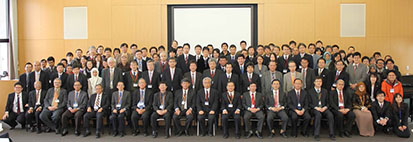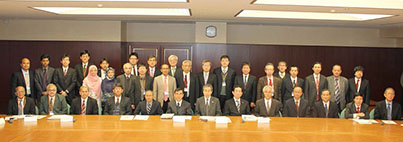Events
Kyoto University Global COE HSE Symposium 2012
Date: December 2, 2012 (9:15 - 16:00) Registration: 8:45
Venue: Global Hall JINYU, C Cluster, Katsura Campus, Kyoto University
Organized by:
Kyoto University Global COE Program "Global Center for Education and Research on Human Security Engineering for Asian Megacities"
Co-organized by:
- Graduate School of Engineering
(Civil and Earth Resources Engineering, Urban Management, Environmental Engineering, Architecture and Architectural Engineering)
- Graduate School of Global Environmental Studies
- Disaster Prevention Research Institute
Number of attendants: about 140
Report 235
Purpose
Near the end of Kyoto University Global COE program “Global Center for Education and Research on Human Security Engineering for Asian Megacities,” it organized a comprehensive symposium entitled “Kyoto University Global COE HSE Symposium 2012,” the purpose of which was to review the education and research activities of the past five years and to share a future collaborative direction with HSE members from the overseas bases, including Japan, China, Vietnam, Singapore, Indonesia, Thailand, India, and Malaysia.
Report
On December 2, 2012, the symposium opened with the GCOE-HSE program members from Kyoto University, related universities of Asian countries, and graduates/students from the HSE education program. During the morning session, Assist. Prof. Yoshida served as master of ceremony and introduced six presenters, including the GCOE-HSE program leader, the GCOE-HSE education program leader, and the four research field leaders.
Prof. Matsuoka, the GCOEHSE program leader, delivered the opening speech and briefly explained the meaning of human security engineering. In addition, he introduced the education and research activities of the GCOE-HSE program for the previous five years. Then, Prof. Monnai, a leader of “Urban Governance” field, introduced the concept, process, and indicators of urban governance Next, Prof. Ohtsu, a leader of “Urban Infrastructure Management” field, described the five major projects in the field and introduced published textbooks, including “Geotechnical Infrastructure Asset Management”, Following Prof. Ohtsu, Prof. Tanaka, a leader of “Health Risk Management” field summarized the last five years’ education and research activities in this particular field and clarified countries and categories of research projects, including “Safe Water and Sanitation” and “Water Pollution and Control”. Prof. Tatano, a leader of “Disaster Risk Management” field, briefly explained eleven research projects and the basic discipline of implementation science in this field. Following Prof. Tatano, Prof. Yoneda, the GCOE-HSE education program leader, delivered a brief summary of the concept, objective, and curriculum structure of the HSE education program and stated that 148 students from various countries participated in the program during the project term.
In addition, the symposium invited four students/graduates from the HSE education program who presented their activities during their time in the program. First, Ms. Sukanya Misra, who is a second-year doctoral student, presented the assessment of human security using a case study in Mumbai. Mr. Taweephong Suksawat introduced his research study in Thailand, which focuses on landslides 2010–2011 in Thailand. His on-site internship was also introduced. Then, Dr. Azuma, who is currently an Assistant Professor of Osaka University of Pharmaceutical Sciences, talked of his global activities with Tsinghua University and expressed his sincere gratitude for support from the HSE educational program. Finally, Mr. Choi, who is currently a researcher of DPRI, spoke about his activities at the Mumbai overseas base and showed the risk governance framework, one of his research topics.
That afternoon, Assoc. Prof. Hirayama participated as master of ceremony, introducing representatives of the HSE overseas bases. First, from Shenzhen base, Prof. Guan, who is a representative of Tsinghua University, provided a history of the collaboration between Tsinghua University and Kyoto University. Specifically, he illustrated how education and training programs, including bilateral internship activities, were conducted. Next, Prof. Tanaka, a leader of the Shenzhen base from the Kyoto University side, shared not only educational activities, including internship activities and training courses, but also research activities that encourage collaboration with private companies, public sectors, and academic societies. Then, Prof. Hai from Hanoi University of Science and Technology, Hanoi overseas base, introduced the office and the laboratory installing various equipments. In addition, Prof. Fujii, who is a leader of the Hanoi overseas base, explained the EML program, which was pallallery conducted with GCOE-HSE program, and reported that the Hanoi overseas base accepted internship students from Kyoto University (19 students, 928 person-days in total). From the Bangkok overseas base, Prof. Ohtsu offered a schematic view of joint research works with the Asian Institute of Technology and main joint research works, such as field monitoring, focusing on landslide caused by torrential rainfall and the great flooding in 2011 in Thailand. He also explained a spin-off project entitled “Re-inventing Japan University Project: International Course on Approaches for Disaster Resilience.” Next,
Assoc. Prof. Phien-wej from Asian Institute of Technology, Thailand, briefly explained educational activities and symposia initiated by the present GCOE-HSE project. In addition, he directed future HSE research activities based on Bangkok’s flood experiences in 2011. From the Singapore overseas base, Prof. Taniguchi first delivered a brief explanation of research topics such as city logistics, traffic safety, and resilient logistics systems during disasters. From the Centre for Maritime Studies, National University of Singapore, one of the overseas bases, Prof. Bernard Tan touched upon CMS-NUS and CMS’s approach, which is composed of capacity-building academic research and industry-oriented collaborative research.
Afterward, Prof. Matsuoka, a leader of the Bandung overseas base, outlined the scope of events and introduced Prof. Djoko Santoso, who is a main counterpart of the Bandung overseas bases and currently Director General of Higher Education Directorate, Ministry of National Education and Culture of Republic Indonesia. Prof. Djoko Santoso’s presentation was entitled “GCOE program after 5 Years and Its Impact on ITB mission.” In ITB with KU, research projects such as “Identification of Land Subsidence, Sea Water Intrusion, and Groundwater Level Lowering”; and “Development of Geophysical Monitoring Techniques and Its Application in Geothermal and Hydrocarbon Research” were conducted and continued. Thirteen events, including symposia/ workshops/seminars and special/guest lectures, were held during the project term. Moreover, the book entitled “The Contribution of Geosciences to Human Security” was published as a result of this program. Prof. Misra, who is a senior advisor and coordinator of the GCOE-HSE Mumbai project, and Professor Emeritus of the School of Planning and Architecture, New Delhi, explained the framework of Mumbai-base activities, which focuses on implementation science for integrated disaster risk management. Then, Prof. Chetan Vaidya, who is a director of SPA, New Delhi, pointed out that SPA followed up the entire Mumbai project. Finally, from the Kuala Lumpur overseas base, Prof. Nik Meriam, who is a representative of the University of Malaya, reported on research and educational activities in Malaysia. Particularly, she introduced the spin-off project entitled “Asian Core Program: Research and Education Center for the Risk Based Asian Oriented Integrated Watershed Management,” which was launched this year.
In additions, three representatives from Kyoto University delivered a presentation about the prospects of HSE in the Asian regions. First, Prof. Yoneda announced that the HSE education program will continue after the end of GCOE-HSE project. Prof. Fujii, Dean of the Graduate School of Global Environmental Studies, explained the other GSGES’s projects in parallel with GCOE-HSE project, and introduced alumni activities. Next, Prof. Ohtsu explained that the internationalization plan of our group in Kyoto University stressed the importance of collaboration between Asian countries. Finally, Prof. Matsuoka gave HSE gifts to invited foreigners and closed the symposium expressing gratitude to all of the participants.
External Evaluation of the GCOE-HSE Program
After the symposium, the external evaluation meeting under the chairperson, Prof. Kusumi, President of Kansai University, was conducted with respect to “Organization,” “Education,” “Research,” and “Impacts and Future Plan.” The members of the external evaluation committee of Kyoto University Global COE-HSE program composed of nine members from the representative of the related universities in Asia. The score of “Impacts and Future Plan” was a bit low compared to the other items due to the lack of prospects for funding GCOE-HSE activities; the other items, however, received high evaluations. You can see the detailed result of the external evaluation from the GCOE-HSE website.
Courtesy Visit to Kyoto University Executives
On December 3, 2012, the invited foreigners visited the executives of Kyoto University, including Prof. Yoshikawa and Prof. Mishima, Vice Presidents of Kyoto University; Prof. Mori, Director of International Centers; and Prof. Kitano, Dean of Graduate School of Engineering. In the meeting, they explained the future collaborative framework among Kyoto University and universities in Asia is being considered by the Japanese government. They added that although the educational collaboration, including the double-degree program, is still being discussed at Kyoto University, the guidelines for Kyoto University’s educational collaboration will be completed in near future. Kyoto University’s executives welcomed the guests from Asian universities and all of the participants conducted fruitful discussions about the future framework for education and research activities in Asia.
This concludes the description of the reports concerning the GCOE-HSE events on December 2 and 3, 2012. About 140 persons—including invited foreigners, GCOE-HSE members of Kyoto University, and students/graduates of the HSE education program—attended the symposium on December 2, 2012. The GCOE-HSE project will end this fiscal year; however, past-five-years activities were regarded an unexampled trial of this field. This was the first step for the establishment of human security engineering and the creation of a human security network in Asian countries. Kyoto University’s HSE group and the other related Asian universities are highly encouraged to continue to develop HSE research and education activities in the future.


